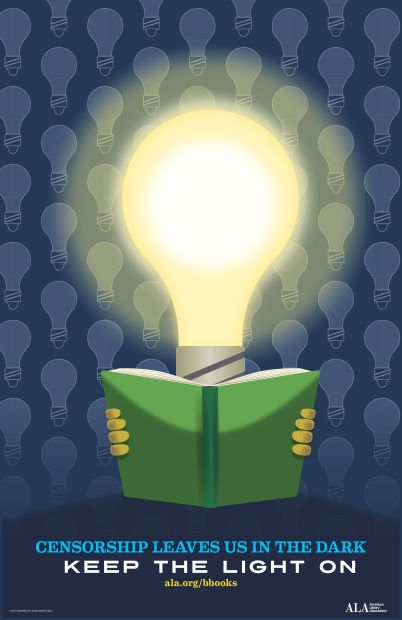I would like to take a moment from relishing in the deliciousness of the orange buffoon’s presidency possibly, hopefully, finally crumbling, to remind myself and everyone else that Banned Books Week is for everyone, even the worst among us. Over the years, I have seen first-hand unethical acts from my fellow librarians, all with good intentions, censoring books from right wing or even fascist sources, including Fox News pundits, alt right figures, anti-Semites, misogynists, and, of course, those who are anti-LGBT. This isn’t right. When I look at library displays of banned books or see the list of the most frequently banned books from ALA, inevitably the titles consist of mostly LGBT content or condemnations of racial inequality. I don’t doubt for a moment that those types of titles are challenged more than others, but I find it difficult to believe that there aren’t enough right-wing books being challenged to be worth mentioning.
Let’s be clear about a few things, in case you don’t know me. I am gay. I am a Unitarian Universalist as well as an atheist. I minored in women’s studies in college. In other words, I’m pretty damn liberal. It’s hard to get much more “left” than I without being obnoxious about it. Yet I still firmly stand against censoring right-wing materials in tax-funded public libraries, even when the content is abhorrent and hateful. Why? Because I recognize that the “public” in public libraries doesn’t mean we serve only the members of the public who are not racist, who are not Trump supporters, who are supportive of my marriage, and who would not literally crucify me if they thought they could get away with it. No, all members of the public, even some of the lowest among us, have the right to find the legally-protected information they seek, as awful and wrong as it may be, from the public library just for being a member of the “public.” Because I recognize that “hate speech” is, contrary to popular belief, very ill-defined with very little authority dictating what it is or isn’t and that what we define as “hate speech” can rapidly change within a decade or less. Because I recognize that not all patrons who wish to read “hateful” materials may be reading them prescriptively and may be, instead, reading them descriptively, and it’s not our business as librarians to know what the patron intends to do with the information.
So, every time I see or hear librarians talk about intentionally deselecting titles by writers accused (and especially not convicted) of sexual misconduct or refusing to buy the latest Orson Scott Card because of his horrendous homophobia, my librarian soul dies a little. Hell, at ALA Annual over the summer, I attended a panel discussion with a panelist actually insisting that libraries ban materials that contain hate speech and ban hate groups. Unfortunately, hate groups are just as ill-defined as hate speech and change just as rapidly. The panelist was advocating censorship, plain and simple. In this age of promoting libraries as safe spaces, we must never, ever, make the mistake of promoting libraries as safe spaces from ideas, including hateful ones. Should we promote hate publicly in our displays? No, of course not. But should we carry the latest Ann Coulter book or worse? Yes, unfortunately we should.
I do differ from this Washington Post article, however. Though I believe that libraries, as publicly-funded institutions, should not censor right wing materials or hate speech, I do support the right of businesses, such as bookstores and publishers, to make available only the products they deem worthy. I guess this is why I’m often accused of straddling the fence, of being, somehow both simultaneously, a libtard snowflake and a Nazi. Just don’t censor in libraries, people. It’s not our job to protect our patrons from ideas. In fact, it’s unethical to try.

 About Me
About Me
I think you mean racial inequity. And I’d say hate speech isn’t ill defined but it is rampantly defined. It is defined and applied according to one’s enemies if one is a leftist, as you do for Card here, and nearly for Trump supporters. Defamation is, of course, an extremist tool of coercion, and I’m glad you’re sober about that in one level, but I wish you were in the other.